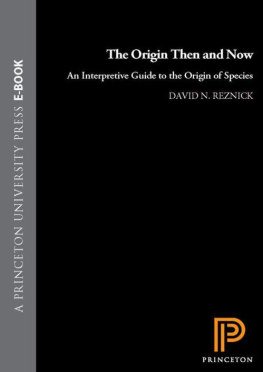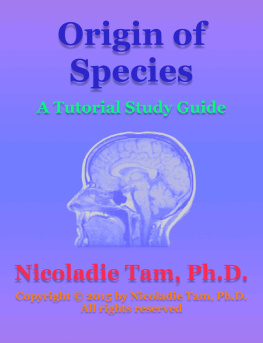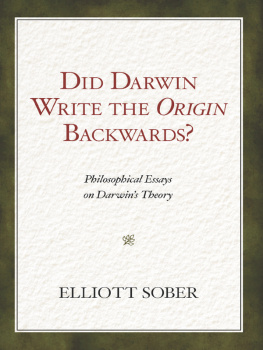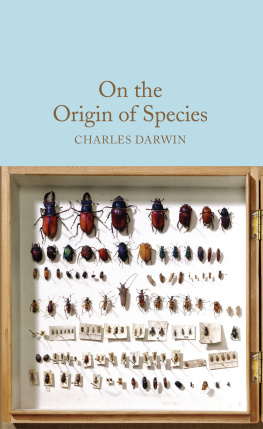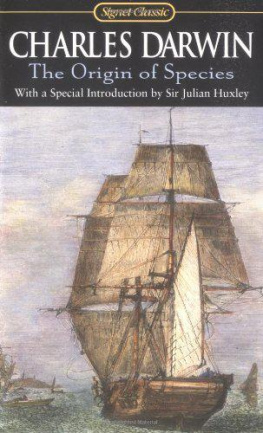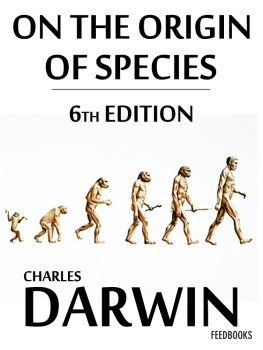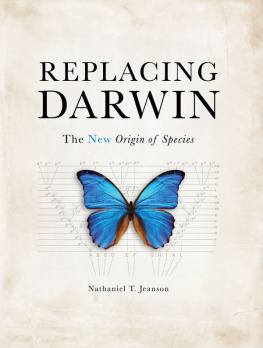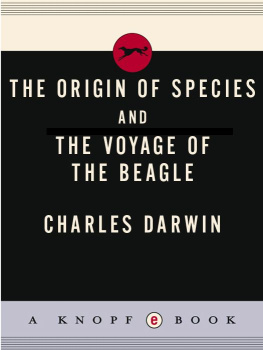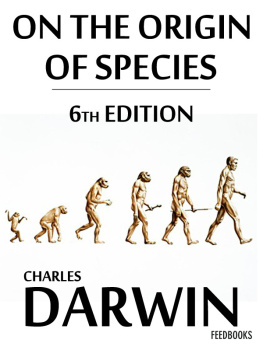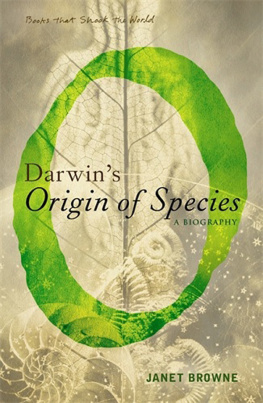The Origin Then and Now

Jaws not so strong as [to] produce pain to finger
This specimen, referred to by Darwin as a male stag beetle
in the genus Lucanus, is now classified as Chiasognathus granti.
Darwin encountered these beetles on Chiloe Island, off the coast
of Chile, and near Valdivia, Chile. The specimen pictured here
was photographed in native forest near Valdivia in February 2009.
The Chilean name for this beetle is ciervo volante, or flying deer.
The Origin Then and Now
An Interpretive Guide to the Origin of Species
David N. Reznick
With an Introduction by Michael Ruse
PRINCETON UNIVERSITY PRESS
Princeton and Oxford
Copyright 2010 by Princeton University Press
Published by Princeton University Press, 41 William Street, Princeton, New Jersey 08540
In the United Kingdom: Princeton University Press, 6 Oxford Street, Woodstock,
Oxfordshire OX20 1TW
press.princeton.edu
All Rights Reserved
Third printing, and first paperback printing, 2012
Paperback ISBN 978-0-691-15257-8
The Library of Congress has cataloged the cloth edition of this book as follows Reznick, David N., 1952
The origin then and now : an interpretive guide to The origin of species / David N. Reznick ; with an introduction by Michael Ruse.
p. cm.
Includes bibliographical references and index.
ISBN 978-0-691-12978-5 (hardcover : alk. paper) 1. Darwin, Charles, 18091882. On the origin of species. 2. Evolution (Biology) 3. Natural selection. I. Title.
QH365.O8R49 2010
576.8dc22 2009013200
British Library Cataloging-in-Publication Data is available
This book has been composed in Minion
Printed on acid-free paper.
Printed in the United States of America
10 9 8 7 6 5 4 3
I dedicate this book to my wife, Melody, and daughters, Tess and Kate, for their support and tolerance during the very long time that I spent writing this book. My daughters are young enough and this project took long enough that I am sure they grew up with some properties in common with Darwins children. Some of Darwins children thought that all fathers had a special room where they hid away to study barnacles. Mine surely think that all fathers hide away on evenings and weekends to write books.
Contents
MICHAEL RUSE
Preface
Darwins Origin of Species has been described as one of the books that is most widely referred to, but least likely to be read. My goal is to make the Origin accessible to a larger audience and to do so by placing it in a continuum of science. The Origin was the inception of a new, unifying theory of the life sciences, but it was also strongly influenced by the science that preceded it; so understanding the Origin requires looking back in time to define the context in which it was written. Sometimes this also means understanding that some details that were critical to Darwins theory were not yet known. The Origin was an inspiration to science because it highlighted these gaps in our knowledge and why it was important to fill them. It was much more of an inspiration because it defined so many new areas of inquiry. To appreciate the Origin, then, it is also important to look forward in time to see how it changed science.
I am an evolutionary biologist and have been studying evolution for over thirty years. I have specialized in the experimental evaluation of facets of the theory of evolution in nature. No one should be surprised to hear that someone like me is a fan of Charles Darwin. But being a fan of Darwin and his ideas is different from being an admirer of the Origin of Species. I first read the Origin during the summer break between completing my bachelors degree at Washington University and beginning PhD studies at the University of Pennsylvania. I cannot recall much about what I learned from that first reading. I do recall finding it very hard going. I finished it out of a sense of obligation. I did not read the Origin again until I was an assistant professor at the University of California, when I decided to use it as part of a graduate class. It was not until I had read the first and sixth editions a few times, plus learned more about the development of evolution as a discipline, that I appreciated the scope and lasting importance of the book. More than a decade later I found myself, as a guest professor at the University of Konstanz in Germany, leading a seminar on the Origin of Species for a polyglot group of graduate students and postdocs. That is when I got a full sense of what the difficulties of the book were, but also of the potential for turning it into a document that would be accessible to a much wider audience. That is my goal with this book. I intend it to be a readers guide to the Origin that addresses the issues that make Darwins masterpiece a challenge to read and yet emphasizes the importance of reading it today, not as a historical benchmark, but as a living, relevant document.
Why is this worth doing? I think that a working knowledge of evolution can enhance anyones understanding of any aspect of biology. For the majority of professional scientists, this knowledge represents a void that will rarely be filled; the growth of biological sciences and the extent to which we have become specialized means that most biologists get little or no exposure to evolution and often do not see its relevance. The general public hears about evolution in the news, mostly as sound bites from the opposing sides of the evolution-creation controversy. People in this wider audience can benefit as much as any student or scientist from understanding the theory of evolution because it has become a central issue in the design and delivery of science education. Understanding will lead to more informed decisions about how education is delivered.
Evolution is also an underappreciated feature of our day-to-day lives. Understanding evolution can help us understand the ever-changing risk of disease (e.g., why antibiotics and insecticides can do more harm than good if overused) or appreciate some of the risks associated with using genetic engineering to modify crops. The properties of plants and animals that make evolution inevitable are central to the development of domesticated breeds, without which life as we know it could not exist. Evolution plays a central role in understanding the impact of humans on the natural environment too, since organisms can evolve on short timescales. It plays a role in determining which species will survive and which will go extinct as climates change. It can play a key role when species are accidentally transported to new environments and become pests that invade and change local communities. Humans cause evolution by being predatorswhen hunting or catching fish, for example. The cod of today are genetically different from the cod that were fished fifty years ago and are less valuable as a source of food because of genetic changes promoted by human predation. All the above represents evolution that happens quickly, within a single persons lifetime, and that profoundly affects our welfare.
All these observations support an argument for understanding the basics of evolution, but these basics can be gained from any general biology textbook. They are not an argument for reading the Origin. One argument for reading the Origin is that it is the first comprehensive statement of the mechanism of natural selection and of the extent to which evolution by means of natural selection can serve as a unifying concept in biology. The
Next page
